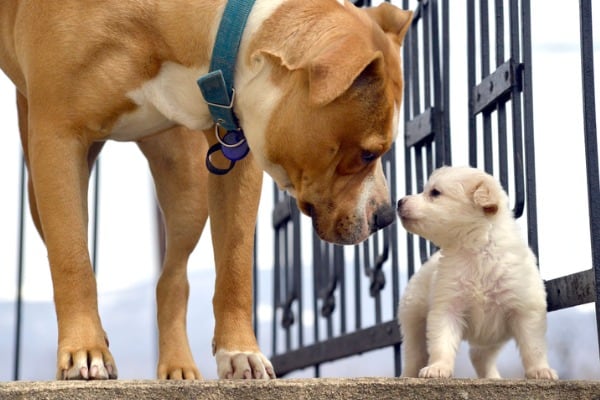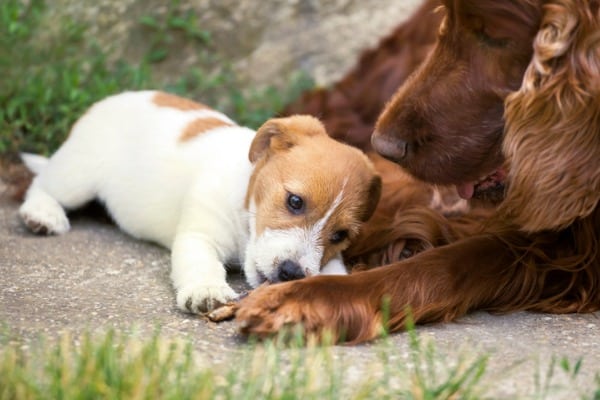If you are introducing a new puppy in a household where an older dog is present, then a whole new host of responsibilities may need to be mulled over intensively.

After all, it’s often recommended to never buy pets on impulse, so weighing your decision carefully could be important before taking any action.
After the jump, you may find a quick list of things to consider when introducing a brand-new puppy to your older dog, some of which we’ve outlined here.
Vets and Insurance
As lovable and social as your puppy might be, there could be a few hoops that you might need to jump through first before they can start mingling with your older dog.
It may be a good idea to consider vaccinations. Vaccinations can help protect your pet against a range of infectious conditions.
The RSPCA recommends that your puppy is vaccinated at around 8-10 weeks and the second dose about 2-4 weeks later.
A booster will be given later, and it’s important to keep your dog’s vaccinations up to date.
You could also explore some multi-pet insurance policies courtesy of Everypaw.
That way, you may be able to gain a discount on your coverage, of which each dog might get a discount to call their own.
Vet fees, including dental treatment, could be included, alongside access to a pet portal to help you manage your pet policies online.
Ultimately, this could make your multi-pet ownership period easier and safer.
Territorial Behaviors
When they meet for the first time, it could be best for your dogs to interact at a neutral location.
This is because your older dog may consider your home or favored walking routes to be their territory, and they may not feel inclined to share the space with new additions to the pack.
Remember, dogs usually only show aggression if they feel under threat so that they may perceive a meeting in their territory as akin to trespassing.
Try to set the first meeting in a brand-new setting for your old dog, if possible.
This may help them ease up and trick them into thinking they are just meeting another dog that they can build a steady rapport with.
Once a friendship has been created outside, moving that bond inside your home should be easier.
Some dogs have behaved differently during periods of quarantine: either happy to be spending more time with their owners or begrudging overcrowded households.
Therefore, you may be walking a fine line in balancing the social climate of your home, so ease them into the new dynamic slowly and gently if you are able.
Supervision Responsibilities
It could be a good idea to closely supervise your dogs while they are getting to know each other.
Remember that socializing your dogs can benefit their overall well-being, so don’t keep them apart unless they are adamantly misbehaving.
It might be that they will only get used to one another’s presence the more they are around one another.
Still, it is often quite difficult to determine what’s going on in your dog’s head. One minute they may be playing or snuggling, and the next they could be butting heads over food, toys, or territory.
Try to supervise them closely and perhaps guide their behavioral boundaries with each other.
Unfortunately, it’s not uncommon for owners to despair when their dogs don’t get along, so much so that they may consider taking one of them back to where they were found.
Try to be patient in your own efforts. As you might with regular training, try not to scold them when they treat each other poorly but praise them when they behave well with one another.
Designating Attention

It could be a good idea to spoil the old dog; that way, they might know that the new addition will not change the dynamics too much.
After all, dogs can feel jealous of rival pets, which is why it could be important to devote more attention to the old dog than the new one at first.
Your puppy might not take this personally at the beginning, as they are still working out their relationship with you and likely still trying to find their position in the pack.
However, because your old dog has a pre-established relationship with you, they may become dejected and disappointed if they are suddenly sidelined.
If you initiate all the fuss and attention yourself, you could improve your bond, and you may help them understand that things won’t change.
After that, it might just be that they will warm to the presence of the new pup a bit sooner.
